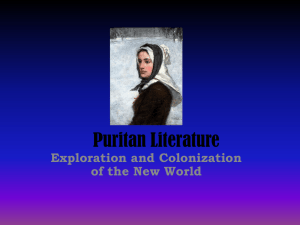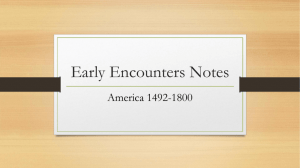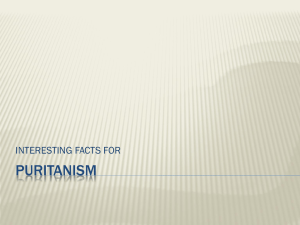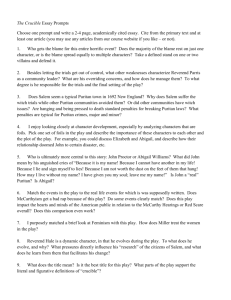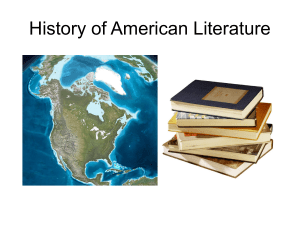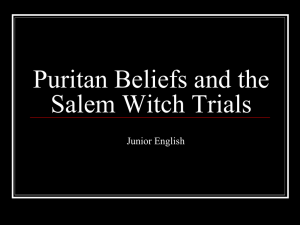The Massachusetts Bay Colony
advertisement
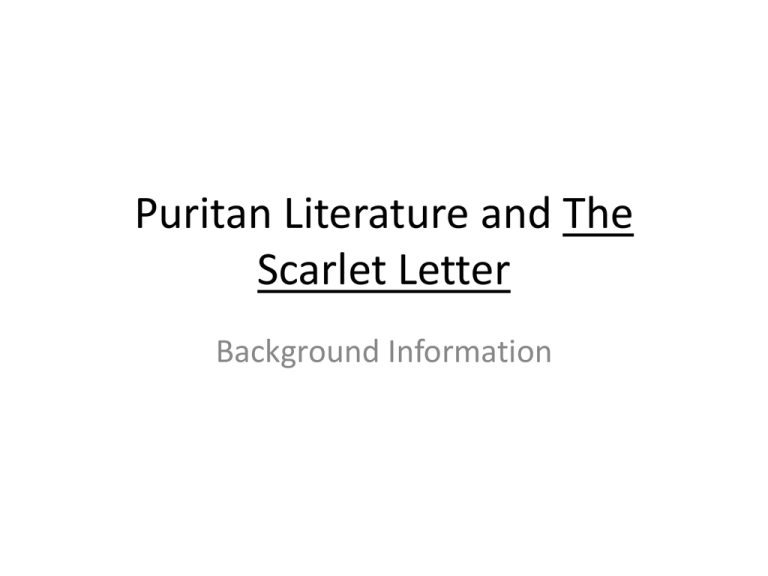
Puritan Literature and The Scarlet Letter Background Information The Puritans-Definition (“Puritans in New Englad, par. 2-3) • Began as a gibe by traditional Anglicans toward those who criticized or wished to "purify" the Church of England. • Referred to two groups: “Separating" Puritans (the Plymouth colonists) Believed that the Church of England was corrupt and that true Christians must separate themselves from it. ”Non-separating Puritans” (the Massachusetts colonists) Believed in reform but not separation Congregationalists who believed in forming churches through voluntary compacts. Puritan Literature Timeline Highlights 1650-Anne Bradstreet’s “The Tenth Muse Lately Sprung Up” published 1621-1st Thanksgiving Celebrated 1620Pilgrims establish Plymouth Settlement; Mayflower Compact 1624-John Smith’s The General History of Virginia published 1692-Salem Witch Trials Begin 1678Pilgrim’s Progress published 1741-”Sinners in the Hands of an Angry God” delivered by Jonathan Edwards 1704-1st Newspaper, The News-Letter, published 1731-1st Public Library established by Ben Franklin in Philadelphia Massachusetts Bay Colony(Boston) Puritans (1680) The Massachusetts Bay Colony Flagship Arbella arrives - 1630 Leader - John Winthrop (PAL, par. 1) Societal Rules Must be a church member to be a “Freeman” (voter) Predestination Covenant bound “God’s Chosen” to enforcing laws on earth Concern about “Proper Behavior” of neighbors Required church attendance Required school attendance/ability to read 1st Puritan College-Harvard Belief in Pure Life Followed model of patriarchal society Colonial Punishments: http://score.rims.k12.ca.us/score_lessons/colonial_court/html/colonial.html John Calvin-Predestination (“John Calvin,” par. 2-4) • T- Total Depravity of Man Man is naturally evil U-Unconditional Election God elects his chosen people before they are created and they become saints in heaven. L- Limited Atonement Only the “elected” people can be saved I- Irresistible Grace God’s grace must be answered P- Perseverance of the Saints It is not possible to lose one’s salvation Puritan Politics • Theocracy- (Literature and the Language Arts 192-194) Societies guided by religious law • Objectors: – Roger Williams Banished from MA in 1635 for speaking against Puritans’ taking N.A. lands Founded R.I. based on religious freedom -- Ann Hutchinson Banished from MA in 1637-Began teaching own religious theories in home Bible classes to men and women Accused of being “more husband than a wife” and threatening religion Major Literary Ideas/Elements • Religion, incl. spiritual struggles • Struggle between conformity and original thoughts • Allegories – a work of literature with two (2) meanings one is the literal story one is the symbolic meaning used to express religious, political, social, or moral ideas Example: The Crucible tells the literal story of the Salem Witch Trials, but facts, events, and characters are changed to represent the events happening during the Red Scare. The Great Awakening • 1660-formation of The Royal Society – 1st science academy in England • English Enlightenment Thinkers Empirical inquiry proper approach for true knowledge John Locke- people began life blank and knowledge was built through the senses Isaac Newton-study of nature revealed God’s plan/design • Puritan Intellectuals Cotton Mather- connected to Salem Witch Trials and belief in “spectral evidence” Jonathan Edwards- preached one needed to experience God through “awakenings” TRANSCENDENTALISM WALDEN POND • Using intuition in nature to help understand a “higher truth” of life • Move away from strictly using the power of reason and scientific approach to understand the world (Enlightenment) • Valued spirituality over materialism • Celebrated “the self” and selfawareness as a way to understand the universe/God • Self-realization/self-expression/selfreliance • Reflect on both positive and negative sides of human nature Nathaniel Hawthorne and the New England Renaissance/American Transcendentalism 1804-1864 (Salem, MA) Related to participants of Salem Witch Trials Contemporary of Poe Considered a Gothic American Writer Credited (with Irving and Poe) with developing modern short story Major Literary Traits Strong use of symbolism A psychological approach to horror Focus with Puritan preoccupation with evil/supernatural Elements of Transcendentalism and Gothicism American Gothic Literature • Castles/Large Estates/Castle-like Structures • An atmosphere of mystery and suspense • Death/Decay • Unexplainable Events/Supernatural • Omens/Foreshadowing • Dreams • Damsels in Distress • Sense of doom and gloom • Romantic themes of obsession, romance, insanity, inner turmoil Grotesque Arabesque Poe is known for writing the grotesque type of gothic literature; enhancing the details of the gross. Hawthorne is known for writing the arabesque type of gothic literature; enhancing the details of the supernatural and inner angst. Works Cited "John Calvin." GREATSITE.COM: Antique Bibles, Rare Bibles, Ancient Bible Leaves. Web. 13 Oct. 2010. <http://www.greatsite.com/timeline-english-bible-history/john-calvin.html>. Literature and the Language Arts. the American Tradition. St. Paul, MN: EMC/Paradigm Pub., 2001. Print. "PAL: American Puritanism: A Brief Introduction." California State University Stanislaus | Home. Web. 13 Oct. 2010. <http://www.csustan.edu/english/reuben/pal/chap1/1intro.html>. "Puritanism in New England." Washington State University - Pullman, Washington. Web. 13 Oct. 2010. <http://www.wsu.edu/~campbelld/amlit/purdef.htm>.
